“I Had A False Idea Of What Confidence Is.” Interview With Steve Markle, Director Of SHOOT TO MARRY
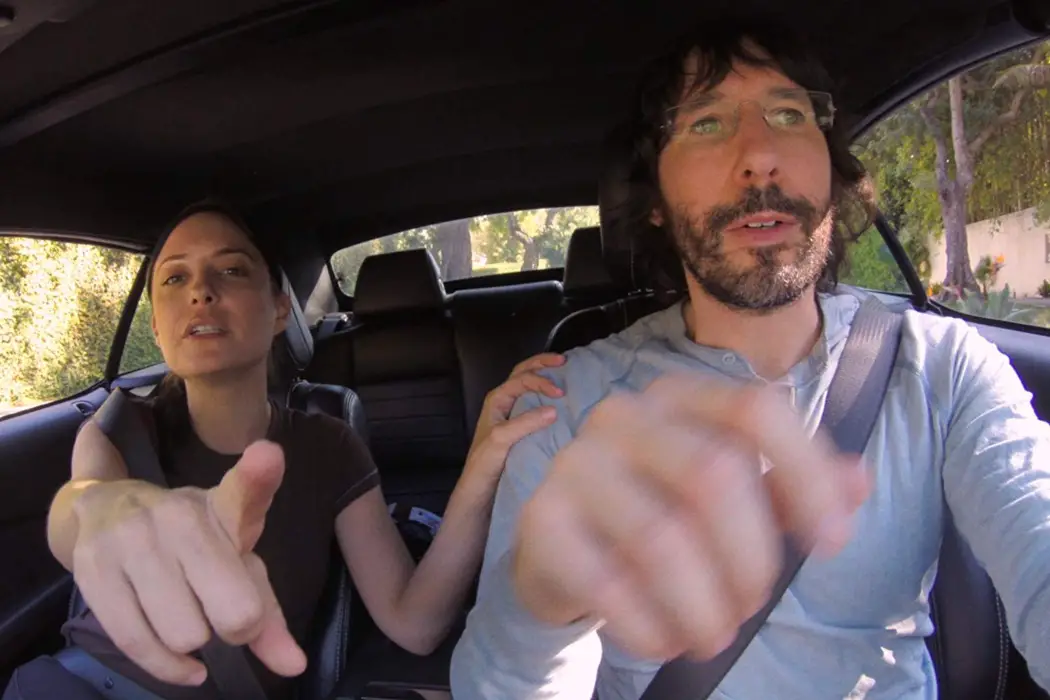
Musanna Ahmed is a freelance film critic writing for Film…
Shoot to Marry is a real-life rom-com, a documentary film in which director Steve Markle documents himself after a bad break-up in his quest to find a wife, recording each of his interactions and dates with women. A lightweight premise with heavyweight emotions, the subject is refreshingly self-aware in presenting his evolution as a man and proves to be a natural storyteller with a gift for finding comedy in any moment. It’s a highly entertaining journey of modern romance.
I had the opportunity speak with Markle about his film after it had its world premiere at Slamdance 2020 and we discussed many aspects of the film including women’s responses, relationship advice and why this documentary was more challenging to put together than his previous one.
Musanna Ahmed for Film Inquiry: Has the Covid-19 pandemic impacted the journey of your documentary, at least on the festival circuit?
Not hugely, to be honest. Some people submit their films to dozens of film festivals and dedicate the year to travelling the world with their film and get that poster with twenty laurels on it. That wasn’t important to me especially because I don’t love travelling so much. I’m very much a homebody.
When the film was finished late last year I submitted it only to a handful of film fests that were really important to me. Slamdance was on top of the list so I was thrilled when I got a yes from them and had my world premiere there – the timing was fortunate. I was planning to do a few more festivals and have a Canadian premiere but I was never planning to do a full circuit. Plus, it’s expensive!
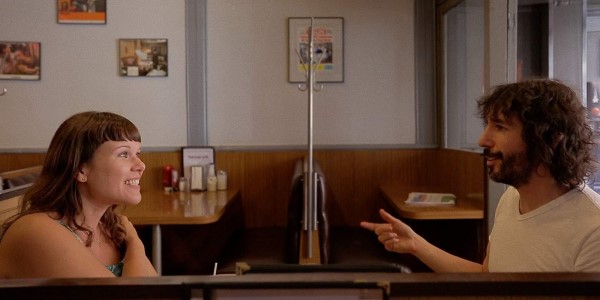
How was the premiere at Slamdance?
It was thrilling! For the years I was working on the doc, it just lived on my laptop and it doesn’t feel like a real movie when it’s just living on your laptop. So to finally see it projected on a big screen with an audience, it was a rush. The response was incredible. I was nervous because you never know what the reception is going to be. I was especially nervous about how women might take the movie but thankfully the women in the audience liked it even more than the men. That was a relief. It was a very enthusiastic Q&A and people stuck around beyond the Q&A to ask questions and that was awesome.
Why do you think the women connected to the film more positively than you expected?
I think they connected with the fact that I was being open, vulnerable, and authentic. I haven’t always been this way in my life, it’s something I’ve worked on over the years of filming and it was my biggest lesson whilst interviewing all of these interesting women. All of them had some sort of advice for me when it came to dating and relationships and one of the pieces of advice I repeatedly heard over the years was simple but effective – just be yourself. Are you currently in a relationship?
I’m not but I did write in my review that the lesson of just being yourself was my biggest takeaway from your film too.
Okay, good. It was definitely the biggest lesson for me in real life, I heard “just be yourself” again and again. Even though it’s so obvious, it’s way easier said than done. Like if you’re on a first date, you’re going to try and show the most charming version of yourself and it’s hard to let go of some of that and just be in the moment and be yourself, whatever that looks like. If you’re feeling fearful or anxious, you should allow yourself to be that. I remember when I was in high school and my older brother said to me, women are attracted to confidence.
We’ve all heard that and it’s certainly true – people are attracted to confidence. But I had a false idea of what confidence is. I took it to mean that maybe I was supposed to put on some sort of macho, act like a man, “be cool” facade. I’m 48 now. It wasn’t until so much later in my life, until making this movie, that it finally clicked that true confidence was simply being yourself. Putting on an act for people is exhausting and, at a certain point, people see the true you anyway. If you show the real you on the first day and people don’t like who you are then, f*ck ‘em.
You mention that you falsely thought you had to be more macho. That idea coincides with the cultural shift in masculinity over recent years. As you met different women along the way, did this shift mean it was a different world of dating, compared to dating when you were younger?
I didn’t necessarily feel that it was a different world. I think the dynamics between men and women are more or less the same. The change happened inside me. It was letting go of this insecurity, this idea that I needed to charm the girl or put on some other face. I would even say that idea was drilled into me in my previous relationship – I can see now with space and time that that relationship was really damaged because my ex had put it in my head that I should act a different way.
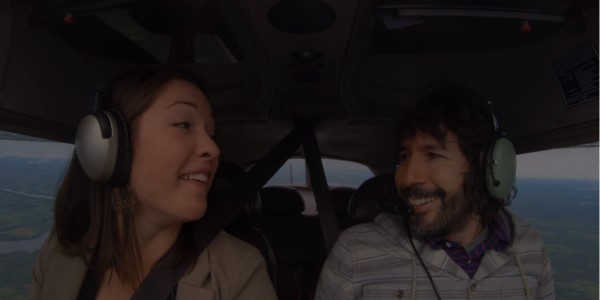
For example, if we were going out to meet up with her friends at a bar or restaurant, she would always say to me beforehand, “just be normal.” In other words, don’t be me. Listen, we didn’t belong together, but I went along with that. She didn’t want me to embarrass her and what changed after we broke up was letting go of that and just being myself. That’s the only way you’re ever going to meet someone who is truly a match, showing your quirks and insecurities, the good and the bad.
If you can look at things as objectively as you can, what would you say were the biggest differences about yourself at the end from the start? Obviously, we’ve just talked about being yourself but there’s always a complexity with the tangible changes you have to make and the more subtle, nuanced ones.
One of the shifts that happened to me over the course of the year that I was filming was that I needed to let go completely of the resentment I was carrying with me for my ex. I don’t think we’re ever really ready to have a new, healthy relationship until we drop our baggage from past relationships. When I look back now, I don’t see resentment, I accept that we were two people who didn’t belong together. It’s no one’s fault and if I’m gonna blame anyone, it’s myself for not having walked away sooner.
So your advice to others in the same situation is, as well as to just be yourself, it’s to give up resentment for past partners.
Yeah. If you’re still angry for an ex, you’re still maintaining a relationship with them in your mind. You have to take responsibility and apply the lessons you’ve learned to the next relationship.
Moving away from relationship advice, let’s talk specifically about the film. What made you decide that recording everything for a documentary film was going to be your approach after exiting the previous relationship?
After the break-up – well, it was more than a break-up, it was a failed marriage proposal – I was devastated. I spent a couple of months crying on the couch in my apartment, not going out, feeling broken, and full of questions. At a certain point, I felt inspired to put my pain into a film. I didn’t have an idea of what that film was going to be, I just felt inspired to share my loneliness and feelings of being broken-hearted with other people. The first stuff I filmed was myself sitting in my apartment. This isn’t in the movie, I was just talking to the camera. Self-therapy.
The next thought I had was to go out and interview people about relationships. I interviewed my parents, my therapist, a rabbi, and I still hadn’t quite found the premise of the movie but by interviewing people about relationships I realised that I really should be interviewing women. I should ask women about relationships and womanhood and that way, I’d learn more and maybe even find love again. That set me on a new course which became the premise of the movie.
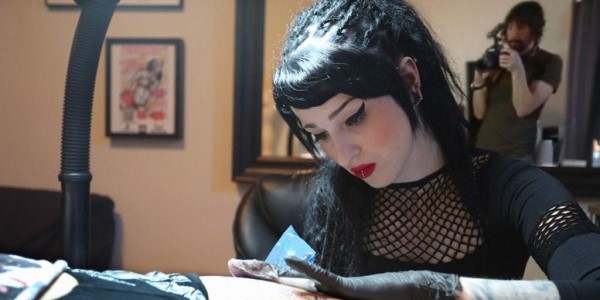
So your pitch to the women was that you were seeking to make a film about modern romance, essentially.
Yeah, when I reached out to the women, often on Facebook and sometimes in person, I would pitch the film as best as I could by saying I wanted to feature a lot of interesting women in this documentary and some of the questions I asked were personal ones about love and relationships. The one piece I left out was the idea that maybe if I clicked with one of these women, we might want to start a relationship. It would’ve sounded creepy if I included that in the pitch. [laughs] But yes, I pitched a documentary about women who would discuss with me their experiences with love and relationships.
When you’re making a film like this, you can never know when you’re going to stop filming. It could be a journey that lasts ten days or ten years. Was there ever a point where you thought of stopping?
Well… every artist struggles with that. Whether you’re filming or painting or producing a song, you’re always asking yourself if it’s actually done. The documentary became a security blanket, in a way, so it’s hard to really say if I ever thought of stopping.
I loved the script you wrote to narrate the film. I thought it was very funny and insightful in capturing your emotions. How long did it take to write? What was the process?
As I was filming, I was keeping a diary. I knew that when I was in that emotional hole that I was feeling like shit but wasn’t always going to feel this way so I thought it was best to get down my thoughts on paper. Every day, even if I wasn’t filming, I’d write down my thoughts. Like I said before, for months and months it was all negative. “You’re shit, you’re garbage.” All the months of writing in a diary made it easier to write the final narration and get it right.
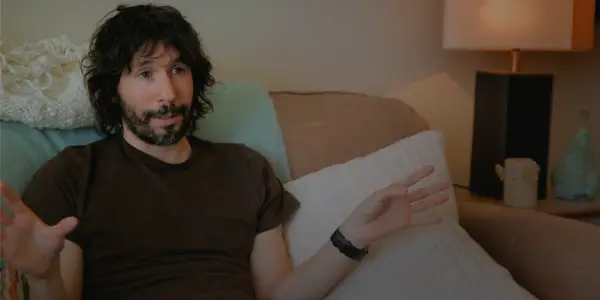
Through your writing and editing, you display a gift of creating character and finding comedy in any moment. What was your experience in audio-visual storytelling prior to this? It’s obviously not a first-time filmmaker’s work.
Shoot to Marry is actually my second documentary feature. My first film, Camp Hollywood, is available on Amazon Prime. It’s about fifteen years old and was shot just before TV switched to 16:9 aspect ratio so we shot it on the old 4:3 aspect ratio. In my thirties, I lived for a couple of years in a shitty two-story apartment complex and I was trying stand-up comedy. I was living with other comics, actors, and musicians in this apartment complex and the doc is a video diary of that community of eccentric artists. Young people who were at the start of their careers trying to do something in L.A. and older folks who had retired there. A really eclectic mix of people.
Apologies that I haven’t watched Camp Hollywood yet, is it stylistically similar to Shoot to Marry?
Yeah. My narration also runs through that film and it’s a very personal doc, shot from my perspective. The first-person POV style of storytelling is what’s most natural for me as someone who’s introverted. I like to put viewers inside my head, whether they want to be there or not. [laughs]
Due to the bigger scope of Shoot to Marry, was it more challenging to put together?
Yes, this one was more of a challenge. I showed a lot more of myself in this one. Some of that comes from knowing myself better but it’s also age and maturity and confidence. It was more challenging because I was doing two things at the same time – making a movie and also looking for love. Every interview I went to, I was a one-person crew. I’d show up to meet a woman and try to establish a rapport whilst also setting audio levels and making sure the focus was good. It was a real juggernaut. [laughs]
I enjoy how honest your narration is in capturing your past self, especially in the first act, and how you developed over time. What would your response be to critics who take umbrage at the self-pitying or the “incel”-ish characterisation at the beginning?
I presented myself in a way that was honest and people are going to like the film or they’re not. What else is there – I mean, I’m not going to obsess over anyone who doesn’t like the film and just hope more people like it than don’t. I made the film because I hoped to connect with people who are also feeling lonely, heartbroken or looking for love and I think more people should share their stories of heartbreak.
When you look at the kind of love stories people are sharing on social media, for example, people love to share photos of their perfect vacations with their significant other celebrating their wedding anniversaries and all that stuff. Which is great! But why not post about their shitty breakup or how lonely they might feel? Maybe they talk about that with their friends or their therapist but I don’t think anybody should be embarrassed about that stuff. I think it’s good to share stories of heartbreak because we all know what that’s like.
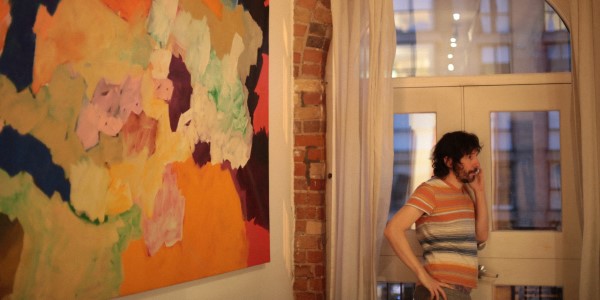
Certainly. I think as a result of presenting the honesty of heartbreak, this is one of the better rom-coms I’ve seen in a while. I want to talk about the soundtrack for a second. I loved the catchy leitmotif that played every time you met someone new. It almost felt like it was parodying the archetypal rom-com at times too when the emotions got heavier. Could you tell us about the process of crafting it?
Thank you for saying that. All of the music was pre-existing and licensed from Universal Music. I wanted it to have a vintage 70’s/80’s rom-com feel. So a lot of kitschy music, some classical, with a bit of a dated, campy feel to it. A lot of that comes out of my age and what I grew up with. I was born in ‘71 so I grew up listening to Seventies rock: The Beatles, the Rolling Stones, Supertramp and the great soul artists like Stevie Wonder. That older analog feel has always stuck with me.
In my review, I mentioned that I saw similarities with Ravi Patel’s Meet the Patels but I want to ask you if there were any specific cinematic inspirations, whether narrative or aesthetic?
Not really. Subconsciously, artists pull from anything and everything they’ve seen or heard but I didn’t try to mimic any particular film or style. I tried to tap into my own sensibility, what I find funny, interesting or moving. As a first-person doc, I wanted to tap into the thoughts in my head and show that in an aesthetic that’s pleasing to my eyes and my ears. The film is very much me. But, of course, a lifetime of watching movies and listening to music and reading books and podcasts ends up on the screen in some way or another.
Have any of the women in the film seen Shoot to Marry yet? If yes, what did they think?
Well, I reached out to all the women in the film to let them know that it was having its premiere at Slamdance and heard back from quite a few of them. They’re excited to see it and I’m crossing my fingers that they love it. Certainly, I had fun filming with all of them and I think they had fun too. I’m not sure if they know what kind of film to expect because I wasn’t exactly sure myself when making it. I just hope they love it.
What do you plan to do next? Any projects in the pipeline?
I’m thinking about continuing with the same theme of relationships but from the other side of someone who’s in a marriage because that opens up a whole different set of questions and challenges. How do you keep the romance alive in a life-long relationship? How do you manage it? I would love to create a documentary that takes on this topic. Many friends of mine are divorced or miserable so I see there can be trappings but I also have plenty of friends who are in happy and healthy marriages too. I’m interested in exploring those challenges.
I think that would be a really interesting follow-up. I’m looking forward to whatever you have to do next, Steve.
Thank you for this conversation!
Film Inquiry thanks Steve Markle for taking the time to speak with us!
Shoot To Marry drops on iTunes and all major VOD platforms across North America on June 16, 2020.
Watch Shoot To Marry
Does content like this matter to you?
Become a Member and support film journalism. Unlock access to all of Film Inquiry`s great articles. Join a community of like-minded readers who are passionate about cinema - get access to our private members Network, give back to independent filmmakers, and more.
Musanna Ahmed is a freelance film critic writing for Film Inquiry, The Movie Waffler and The Upcoming. His taste in film knows no boundaries.












